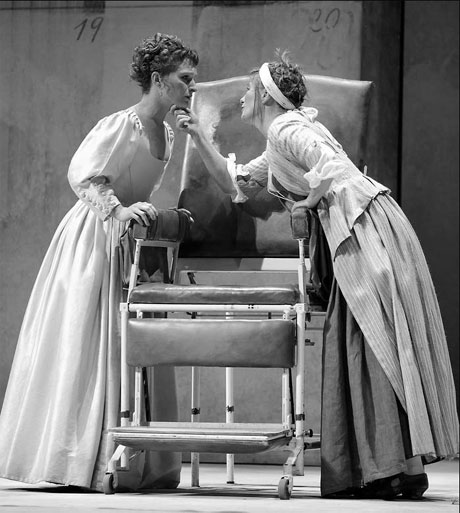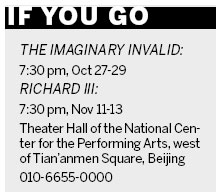Classics that speak of modern frustrations
Updated: 2011-10-21 10:41
By Mu Qian (China Daily)
|
|||||||||||
 |
|
The Imaginary Invalid is a three-act comdie-ballet which contains a scathing social and political commentary on Paris of the 1670s. Provided to China Daily |
The NCPA's Western classic drama series will present Moliere's The Imaginary Invalid by French theater Comedie-Francaise, and an international co-production of Shakespeare's Richard III. Mu Qian reports.
Oscar-winning artists, classic plays and some of the world's most established theater groups will be featured in the Western classic drama series of the National Center for the Performing Arts (NCPA).
The first two works of the series, French state theater Comedie-Francaise's performance of Moliere's The Imaginary Invalid, and an international co-production of Shakespeare's Richard III, starring Kevin Spacey, will be staged at the center from Oct 27 to Nov 13.
"This will be an exchange between France and China, and the best way for us to get to know each other," says Muriel Mayette, general administrator of Comedie-Francaise, who will also play the maid Toinett in The Imaginary Invalid.
"China is a country with a long civilization which is very different from that of France. I believe such an exchange will not only remove cultural barriers but also (help) share something we have in common."
The Imaginary Invalid is a three-act comdie-ballet (a genre that mixes a spoken play with music and dance), that premiered in 1673. A satire of the medical profession, the play contains a scathing social and political commentary on Paris of the 1670s.
Argan, a fearful but miserly hypochondriac, divides his time between summoning the doctor to care for his ills and trying not to settle the resultant bills. He resolves to marry his daughter, Angelique, to a medical student, hoping to acquire unlimited access to gratis consultation. However, Angelique is in love with the young Clante and resists her father, thus risking being sent to a convent. The young lovers eventually convince Argan to liberate himself from the twin tyrannies of his ailing body and his grasping physicians by becoming his own doctor.
The Imaginary Invalid was the last work written by Moliere, who collapsed during his fourth performance as Argan and died soon after.
Mayette says she expects the Chinese audience to see something about their own lives in this play.
"The Imaginary Invalid makes us see our own weaknesses in laughter. The play's hero Argan is a world character, because his weaknesses can be found across borders. This is why we chose to bring this play to China," Mayette says.
Founded in 1680, the Comdie-Francaise is the oldest national theater company in the world, with a repertoire of more than 3,000 plays, a mixture of classic, modern and contemporary works by French and foreign playwrights.
Similar to The Imaginary Invalid, Shakespeare's Richard III also speaks beyond the writer's time and place, according to Kevin Spacey, two-time Oscar winner as best actor, who will play Richard III in the play.

"The thing that is always so surprising about plays written in another century is how remarkably elastic they are. When you listen to the way in which Shakespeare attacks relationships, for example, even though the words may start off sounding foreign, in actuality they are so accessible, the motivations so clear, the resonances so contemporary," Spacey says.
"It is fascinating how relevant it is to a contemporary audience, even one that might not know Shakespeare well."
Richard III marks the grand finale of the Bridge Project, a joint effort of three world renowned theaters - the New York-based Brooklyn Academy of Music, and The Old Vic and Neal Street Productions in London. The project is devoted to producing large-scale, classical theater for international audiences.
The play also marks the first cooperation between Spacey and director Sam Mendes following American Beauty (winner of five Oscar Awards in 1999).
"Shakespeare uses theatrical forms that remain incredibly modern - and one of them is direct address. He doesn't really employ this much in the other history plays; only with Richard in Richard III and Falstaff in Henry IV do you have a man walk to the front of the stage, eyeball the audience, and say, 'You, you people sitting in these seats, I'm talking to you directly'. It remains daring, even now," Mendes says.